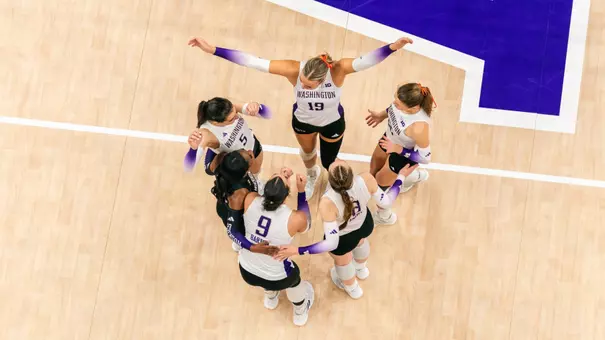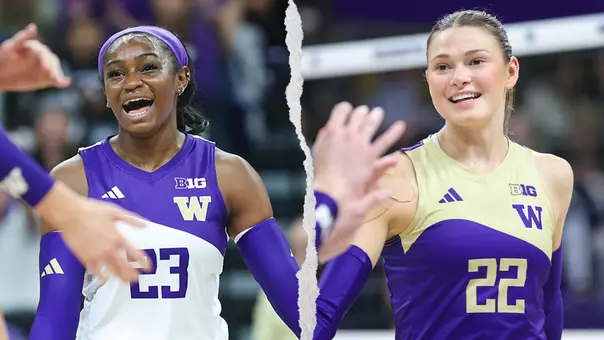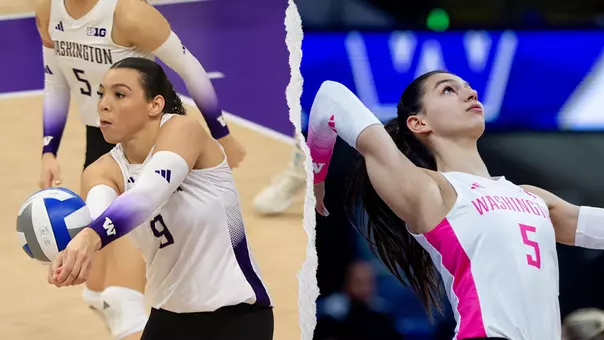
Q & A With Husky Legend Laurie (Wetzel) Hayward
October 04, 2010 | Volleyball
Oct. 4, 2010
Laurie Hayward, the former Laurie Wetzel, was honored this past Saturday as the first in a series of Husky Legends of volleyball. One of Washington's first ever All-Americans, Hayward helped lead Washington to its first ever NCAA Regional Final in 1988 during her senior season. The Huskies that year upset Stanford in the NCAA Round of 16, for their first ever win over the Cardinal. Hayward led the Pac-10 in kills and digs that season, and was named a First Team All-American. Her 41 kills against Arizona State her junior year remains a Washington single-match record, and she remains fourth on the UW career kills list with 1,580, and fourth in career digs with 1,233. She would marry former UW basketball star Mike Hayward, and the two have two daughters, Samantha and Natalie. The Hayward family currently resides in Bothell, and Laurie works as for Brooks Running. Hayward talks about her volleyball career after UW, the positive impact her athletic experience made on her career, and the secret pre-game meal that fueled her record-setting night.
GoHuskies.com: So do you get to make it to many matches or will Saturday be your first time back in a while?
Laurie Hayward: No I try to get to two to three matches a year. I have 10- and 11-year-old daughters and they like to go.
GH: Are your daughters very active in sports?
LH: They probably have some future in volleyball. They play volleyball, basketball, and fastpitch.
GH: Oh so they're going pretty much year round then. Since your husband was a former basketball player is there any sort of tug-of-war as to what sport they should like best?
LH: (laughs) Right now it's all about keeping them happy and just having fun while they're playing. As things get a little more competitive they will probably have to think about choosing one path to go down.
GH: How did you and your future husband first meet here at Washington?
LH: There was no single moment, it was just being around other athletes, and he was a fan of volleyball and he used to come to the matches. We dated for seven years until we got married. He went and played basketball overseas and I went to play volleyball and went into coaching after that. So it was a long distance type of thing but we stuck it out.
GH: So is your household pretty pro-UW with two former letterwinners?
LH: Yeah there is a lot of purple. My daughter just wanted her room painted purple for Husky purple. But we try not to pressure them.
GH: You had several coaching stops after college. Can you run down the timeline a bit of where you lived and worked?
LH: After graduating I stayed on as a graduate assistant while working on my Masters. Then I went to Idaho as an assistant for one year, then moved to UC Davis and was an assistant there for three years. After that I moved overseas and played professionally in Switzerland. Then I came back and was an assistant at Fresno State for four years. Steve and I have kept in touch helped.
GH: Playing professionally in Switzerland sounds pretty amazing, was that the reality of it?
LH: At first it was. Mike was playing basketball in Switzerland. It was the first year we were married so we got to live together in Switzerland and I was playing on a team about 45 miles north of where he was playing. Living in Europe together, both of us professional athletes, it was great. But I gave it up after that. I as 27 at that time and figured I should probably get on with my life.
GH: What made you decide to not continue on as a coach?
LH: I think you reach a point as an assistant where you decide that you're going to move on and get a head coaching job or not. We wanted a family and a lifestyle that was a little bit more stable. Coaching requires a lot of moving around and we weren't sure if we'd end up in the same city if that happened. Mike was pretty much done with his career in Europe and got a job at Brooks back here in Bothell. So we landed back in this area. Also, I knew that to be the kind of coach I wanted I wasn't going to be able to be a great mom. I do miss it sometimes, but I wouldn't trade what I have for anything.
GH: Do you coach your daughters at all in volleyball?
LH: I don't. Not yet. They keep trying to pull me in. But they're just getting started in volleyball. I can see myself probably helping out but I'm not sure. I want to be mom first. But I will say that coaching has definitely helped me in the business world, knowing that people needed to be treated differently. I have a team of people that I manage and one reason I've been successful is because of my background in athletics and coaching.
GH: What are some of your fondest memories from your playing days? You guys were the first team to make the NCAA Regional Final so that must have been a thrill your senior year.
LH: That was probably the high point of my whole career. The best part was that nobody expected us to do that well. It was (Debbie Buse's) first year coaching, and we were returning maybe five of six starters. We were expected to be maybe sixth in the Pac-10, and we didn't win it [finishing third] but we had a great run at the postseason. I remember playing in Pauley Pavilion for the Regionals. UCLA had just gotten off the court after winning its match, and we were warming up to play Stanford, with the winner going on to play UCLA the next night. I noticed a UCLA and Stanford player having a conversation and the UCLA player said, `we'll see you tomorrow' as if it was a foregone conclusion. So that really irritated me. Now I didn't just go win the match by myself, but that win and that Regional week was the highlight I would say of my experience.
GH: How have you seen the game change and develop since your time in school?
LH: The first year I played there was the NorPac, which came before the Pac-10. I know it makes me sound old. Just getting up to speed and seeing women's athletics reach the stature that it's at now, and joining the same conference the guys were playing in, that was a big deal. I only played one match in Hec-Ed. We always played in the annex but we got great crowds. We'd sell out and we had to turn people away. Supposedly the basketball coach at the time didn't want to holes for the net posts in the main court at Hec-Ed. But in my senior year, in the first round of NCAAs before Regionals we played Arizona State in Hec-Ed and beat them, and that was my first and only match played there.
GH: It must be gratifying to see the program excel in recent years and to see them get some of the largest crowds in the country and know you were a part of building that tradition.
LH: It's definitely nice to see some of the local kids be successful. Leslie (Gabriel) has done a good job there staying with the program and keeping that local flavor. Local talent like Christal Morrison and Courtney Thompson, it just elevates the program and the area which is great especially for young girls in sports. To see those types of role models, there's nothing better. My girls wanted Christal's autograph and I said, `What about Mom?' and they say, `Why would we want your autograph?'
GH: And now we have the first daughter of a former player currently on the team with April Topham and her daughter Kylin.
LH: Yeah, April and me crossed paths one year. My daughter's been doing clinics and at one of them, Kylin was coaching my daughter. April was there and it was funny to have her daughter was coaching my daughter. I tried to take her under my wing a bit and I always loved her.
GH: Any other differences in the game that stand out to you?
LH: The girls are a lot bigger. I'm 5-11 and I started in the middle for two years. You don't see that much anymore. But one thing I'm grateful for is that they didn't have the libero back then. I wasn't a very good back row player but they had to keep me back in because you couldn't be subbing every rotation. I think I got a lot better just being thrown in there. Nowadays you don't' see that as much and players are more specialized. Also I wish we could have hit the net with our serves (laughs). My serving stats aren't good but if it would have been legal to hit the net they might have been a lot better.
GH: You've still got the single-match kills record with 41; what do you remember about that match? Unfortunately you guys just got edged out by Arizona State, but was it one of those things where you didn't realize how many kills you had until afterwards?
LH: Yeah, I didn't know until the stats come out. I remember I couldn't believe that we lost. The team gathered after the match and of course the coaches were irritated and I remember them saying something to me like `whatever you did to prepare you should do it every time and everyone else should too.' Which was funny because the one thing I did was, back then money was tight and we had maybe six dollars each, and I ordered something for the pre-match meal but I didn't like it and then I didn't have any money left, so right before warm-ups I went to a vending machine and got some candy and scarfed them all. I did try it again for the next match but it didn't work again.











